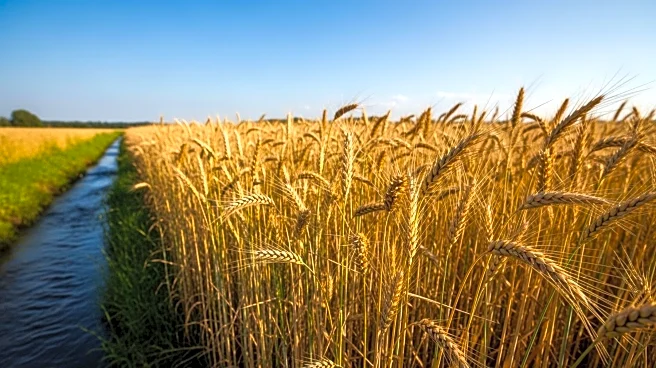What's Happening?
The Federal Committee on Agriculture (FCA) has set a wheat production target of 30 million tonnes for the Rabi season 2025-26, leveraging adequate water availability in Punjab and Sindh, the primary wheat-producing
provinces. This decision follows the previous season's target of 27.92 million tonnes, which was exceeded with an actual production of 28.42 million tonnes. The FCA meeting, led by Minister for National Food Security and Research Rana Tanveer Hussain, emphasized the importance of fair support prices for farmers to cover production costs and earn reasonable profits. The committee also recommended early wheat sowing, quality seed availability, timely fertiliser supply, and the use of herbicides. Additionally, it highlighted the need for innovative technologies and climate-smart agriculture techniques to enhance production forecasting and planning.
Why It's Important?
The setting of a higher wheat production target is crucial for ensuring food security and self-sufficiency in staple food commodities in Pakistan. By focusing on adequate water availability and improved agricultural practices, the government aims to safeguard farmers' interests and boost the agricultural sector's contribution to the economy. The emphasis on fair support prices and access to agricultural credit is expected to enhance farmers' financial stability, thereby promoting sustainable agricultural growth. The adoption of climate-smart techniques and innovative technologies could lead to more resilient agricultural practices, addressing challenges posed by climate change and ensuring long-term productivity.
What's Next?
The FCA's recommendations for early sowing and the use of improved seed varieties are expected to be implemented in the upcoming Rabi season. The government plans to enhance agricultural credit flow, with the State Bank of Pakistan setting a higher disbursement target for fiscal year 2025. The supply of urea and DAP fertilisers is anticipated to remain stable, supporting the cultivation process. The focus on coordinated federal and provincial efforts aims to ensure timely policy implementation and improved irrigation management, which are critical for achieving the set production targets and ensuring food security.
Beyond the Headlines
The government's commitment to promoting the agriculture sector through coordinated efforts and investment in research and development highlights the strategic importance of agriculture in Pakistan's economic progress. The emphasis on mechanisation and improved irrigation management reflects a shift towards modern agricultural practices that could lead to increased efficiency and productivity. The focus on climate-smart agriculture techniques underscores the need to adapt to changing environmental conditions, ensuring the sustainability of agricultural practices in the face of climate change.












